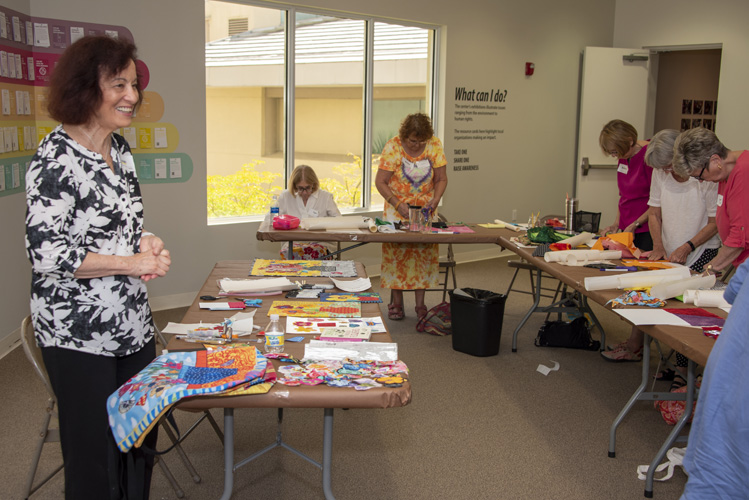
Admire, but please don’t touch.
That’s the general rule for every museum, but docents at the Ruth Funk Center for Textile Arts have a particularly tough time keeping visitors from putting their hands all over the enticing display pieces in their gallery at Florida Institute of Technology in Melbourne. The artwork is soft and warm, silky or sometimes fuzzy, it can be fluffy or itchy, feathery or even rubbery. It simply begs to be handled.
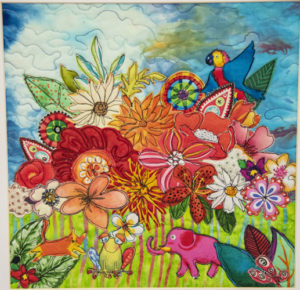 “It’s our instinct to touch everything in our galleries,” said Donna Sewell, manager of visitor services for the Funk Center. “I think textiles are something everybody can relate to. We all wear clothes, we use blankets. It’s something everybody always has in their existence.”
“It’s our instinct to touch everything in our galleries,” said Donna Sewell, manager of visitor services for the Funk Center. “I think textiles are something everybody can relate to. We all wear clothes, we use blankets. It’s something everybody always has in their existence.”
Despite that extreme familiarity, and the fact that there are only a handful of museums dedicated to textile arts, Sewell said, the sheer beauty and serious craftsmanship poured into costume, quilts and other creative textiles are starting to come into their own as a respected art form.
To satisfy children’s urges for tactile play with the textile arts, “we do usually have children’s classes for every exhibit,” said Kitty Drew of Melbourne Beach, a docent since 2015. The Funk Center youth workshops teach kids of all abilities a new technique so students can make a masterpiece to take home. But until recently, adults did not have the same enriching and even therapeutic opportunity.
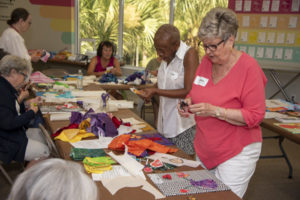 This summer’s powerful art quilt exhibit, “Forced to Flee,” which closed on Saturday, seemed like the ideal opportunity to develop an adult workshop program that, like the youth classes, would follow the theme of the exhibit.
This summer’s powerful art quilt exhibit, “Forced to Flee,” which closed on Saturday, seemed like the ideal opportunity to develop an adult workshop program that, like the youth classes, would follow the theme of the exhibit.
Quilter and fabric artist Susan Rienzo of Vero Beach was selected to teach a no-sew fabric art workshop last week in the Ruth Funk Mezzanine, near where two of her quilts had previously been part of the center’s exhibits, curated by Studio Art Quilt Associates through a juried process. The center doesn’t have dedicated classroom space, but Sewell said a little rearranging of furniture frees up space to accommodate a dozen students.
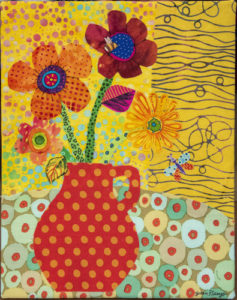 On class day, the mezzanine filled with swatches of brightly colored fabric as far as the eye could see – a rainbow of florals and prints, endless possibilities for creating a still-life collage. Rienzo conceded that the project could easily be done with scraps of fabric, upcycling them into art, but for her shopping the fabric store is a source of inspiration.
On class day, the mezzanine filled with swatches of brightly colored fabric as far as the eye could see – a rainbow of florals and prints, endless possibilities for creating a still-life collage. Rienzo conceded that the project could easily be done with scraps of fabric, upcycling them into art, but for her shopping the fabric store is a source of inspiration.
She grew up amongst the sights, the sounds and the excitement of New York’s garment district where her father worked and her grandfather was a tailor. “I love looking at fabric and buying fabric,” she said. “I have a whole room of fabric.”
The ladies creating art at Rienzo’s workshop, about half of them quilters, adored the fabric selections she brought for them to carve out flowers, leaves and other shapes and affix with a special double-stick material. Some gravitated toward favorite colors, while others took chances with wild hues and combinations of patterns. Rienzo’s own artwork started the creative juices flowing. “I brought some of my own pieces so they could see what was possible,” she said. “But I believe everyone is creative and can do their own thing. I want them to have the confidence that they can create something without a pattern.”
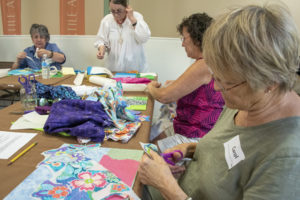 Rienzo’s workshop sold out, so going forward the adult-level workshops will be a regular accompaniment to the exhibits. The next set of workshops, one for kids and one for adults, will feature the talented basket weaver Dean Brown. The take-home will be their very own woven Christmas tree ornament.
Rienzo’s workshop sold out, so going forward the adult-level workshops will be a regular accompaniment to the exhibits. The next set of workshops, one for kids and one for adults, will feature the talented basket weaver Dean Brown. The take-home will be their very own woven Christmas tree ornament.
Admission to the Ruth Funk Center for the Textile Arts is free. For more information about programs and events, visit www.textiles.fit.edu, contact textiles@fit.edu or 321-674-8313.



